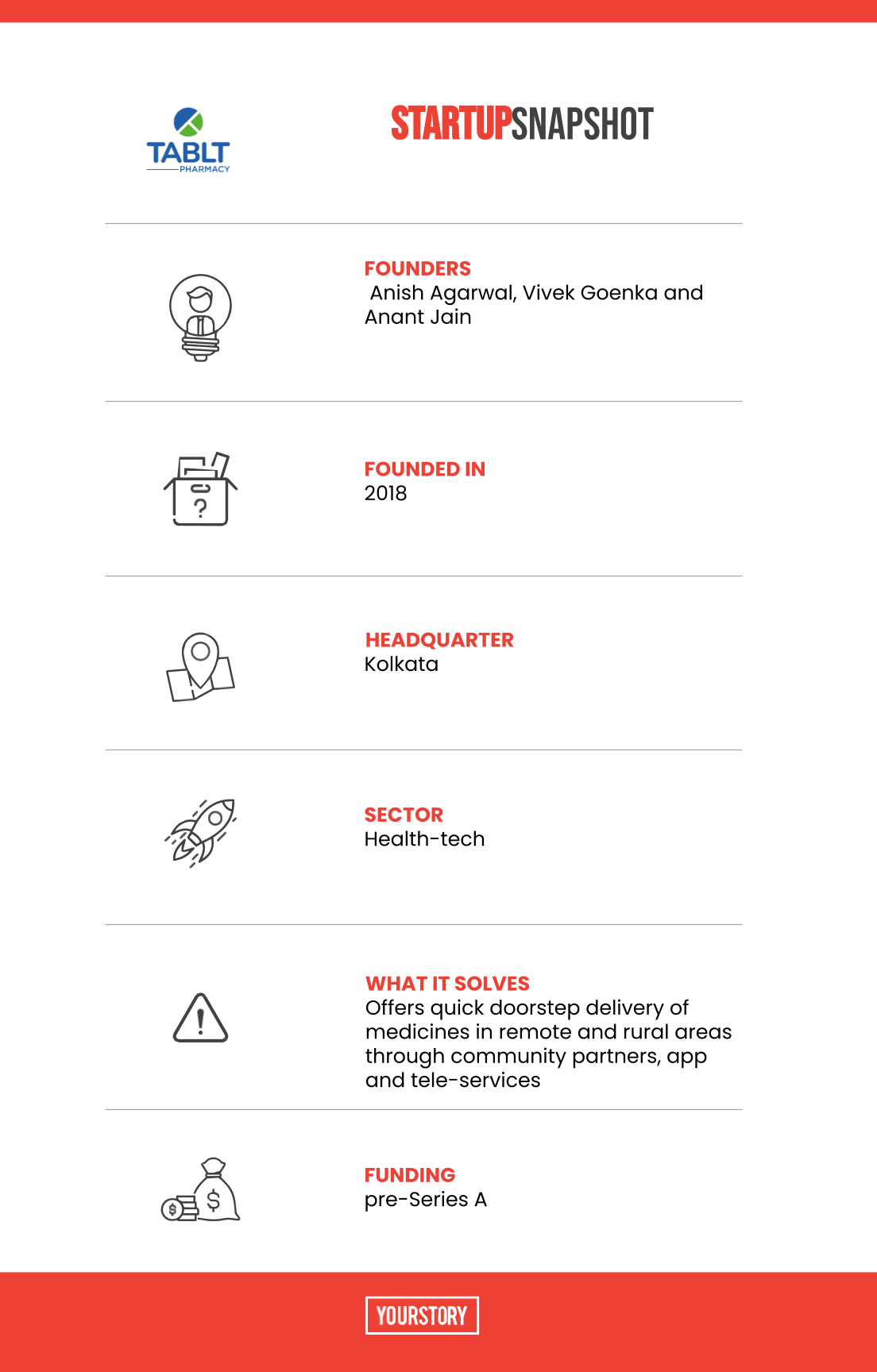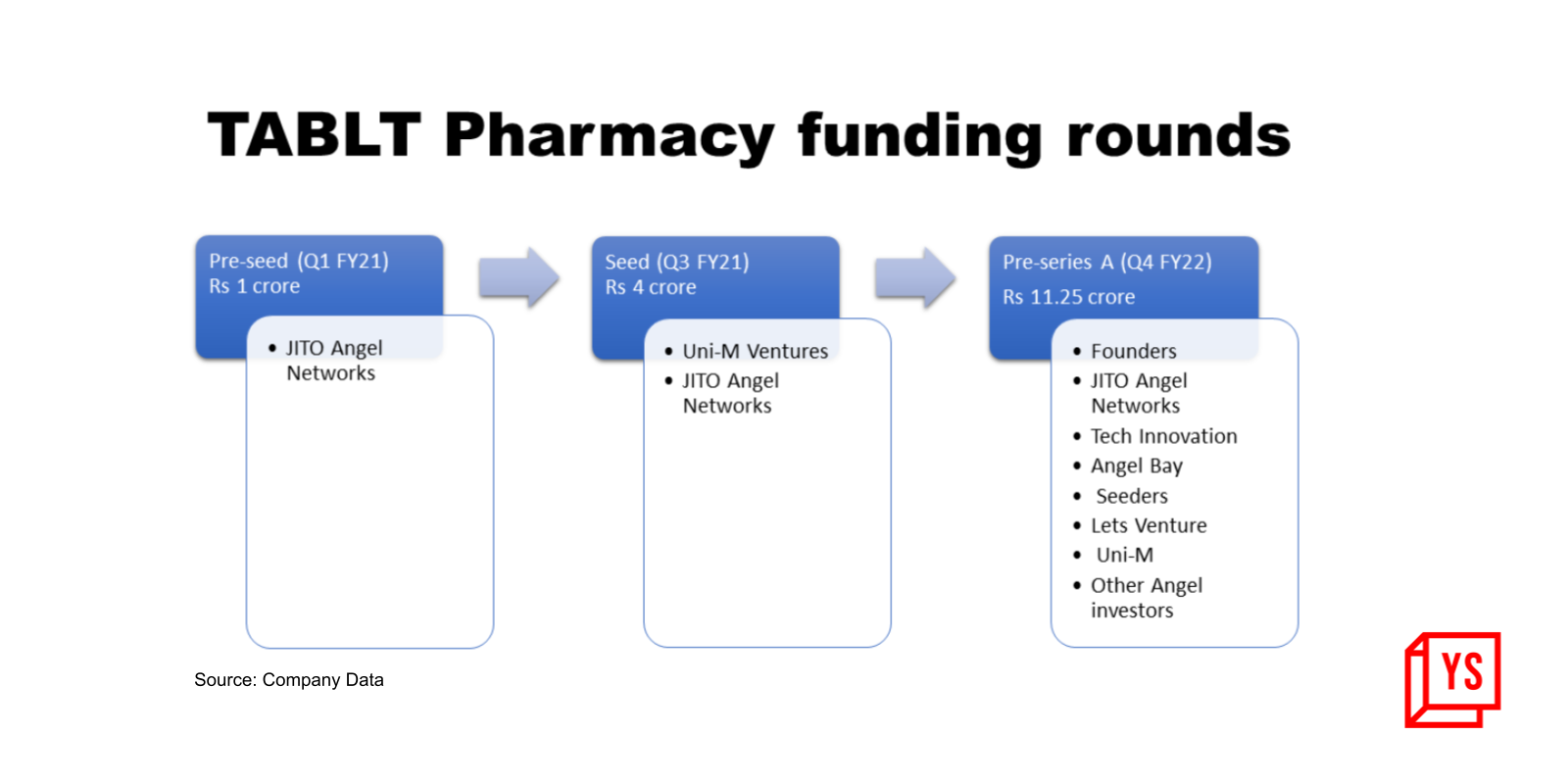In metros and big cities, everything is on call. Even medicines.
But there’s a marked shift when you move to remote and rural areas.
“The moment you move to smaller towns and villages, the delivery time of medicines – with discounts and same/next day in metros -- extends five to seven days,” says Anish Agarwal, Co-founder and CEO of Kolkata-based healthtech startup TABLT. “In most villages, they don't even deliver cold storage products.”
This is why he joined hands with Vivek Goenka and Anant Jain in 2018 to start TABLT, an omnichannel pharmacy that has a presence across 500 towns of West Bengal, Bihar, Jharkhand, and Odisha, and claims to supply over the counter medicines and products in remote locations within a day.
“Local pharmacies are not able to provide all medicines; there are stockouts, generally,” Anish says. In such a scenario, where availability is a concern, availing discounts on medicines is a far-fetched idea.
But TABLT Pharmacy, a spin-off of their earlier venture, assisted ecommerce company Sabse Sasta Dukaan launched in 2016, aims to capitalise on this opportunity by improving inefficient supply chains and serving customers in Tier 2 to Tier 6 towns. Sabse Sasta Dukaan had raised Rs 50 lakh earlier. The startup has a team of about 200 people, with 70 members in its core team, another 70 across its call centres and 60 people across its supply chain.

Serving rural India
Anish tells YourStory that TABLT offers a two-part solution: experience and service.
Customers can avail of its services in three formats: app, teleconsultation, and through a network of community partners.
Most important of these, Anish says, is the 450-people network of community partners, who assist the rural populace with order placement.
This is needed because about 70 percent of TABLT’s customers are older people, above 40 years old, and about 11 percent are above 70 years old.
“People in smaller towns are generally are not very tech-savvy,” Anish says. “Even if they're tech-savvy, they generally operate WhatsApp or Facebook. That is the maximum utility that they get out of internet services.”
It is a challenging task for a lot of them to make seemingly complex transactions on an ecommerce app – going to a search bar to look for a product, changing variables, applying filters, checking out, or paying digitally.
TABLT solves this problem by simplifying this experience, using the community partner model.
These partners are usually local second-generation businessmen in the area with their own shops or a standalone TABLT franchise. They help and place orders on behalf of customers through a portal — an idea that has helped the startup build trust in small areas.
They collect money from customers and get a commission on the basis of the number of orders they help place.
The second part of its experience includes a 24/7, 365-day teleservice for consumers to call and place an order in regional languages of these states, which “most of the other pharmacies don't offer”, Anish says.
“This makes the experience convenient because it is easier for people of that age group to call and place an order. On top of that, they can speak in their own language,” he adds.
Even the TABLT app is available in four languages — English, Hindi, Bengali, and Odia.
About 40 percent of TABLT’s business comes from community partners, 40 percent from teleservices, and 20 percent from the app.
The average order size is close to Rs 1,000 and the healthtech startup claims to be delivering 1,500 orders every day.
The workings and logistics
Most of TABLT’s customers suffer from chronic ailments, like diabetes, hypertension, pulmonary diseases, arthritis, and others.
Chronic care needs the same medicines, month after month. The order history – combined with data analytics and inventory management - helps the startup plan and predict demand.
TABLT says it fulfils 95 percent of customer orders, based on its inventory of 15,000 different medicines. The remaining 5 percent are partially fulfilled.
The healthtech startup at present has two warehouses or fulfilment centres in Kolkata and Bokaro, spread across 15,000 square feet, with a capacity to process about 10,000 orders every day. Of the total, 200 square feet is for cold storage.
Since its inception, the startup claims to have served 1.5 lakh customers who have placed more than 12 lakh orders and says it has delivered orders worth Rs 100 crore of the gross merchandise value. This delivery is across towns like Kishanganj, Patna, Purnia in Bihar, Islampur, Domjur in West Bengal, Patia, Rayagada, Khajuriakata in Odisha, Daltonganj, Ghatshila, Godda in Jharkhand.
For each of these orders, TABLT packs the medicines the same day. Its mid-mile delivery team — a 30-people network — picks up the package from the warehouse every morning and transports it to the community partners, who then hand it over to customers.
Each one of TABLT’s van drivers follows a fixed route, covering 25-30 community partners every day. These vans carry cold boxes, which allow delivery of cold-storage products.
Anish says owning the fulfilment and logistics chains differentiates the entire operation. “It operates at a lower cost compared to many other online pharmacies,” he says.
This helps them service customers with quicker delivery in one day, including cold-storage products.
The pandemic has accelerated consumer demand for the startup, which claims its revenue has grown 6X since 2020.
Market and the future
TABLT competes with the likes of Sasta Sundar, which Flipkart bought last year, in rural areas, and 1mg, Netmeds, and Pharmeasy in urban areas.
In February, the healthtech startup raised $1.5 million in a pre-Series A round from investors, including JITO Angel Network, Tech Innovation, Let’s Venture, Seeders Syndicate, Angel Bay, and other angel investors.

It will use the funding to develop its technology and product and acquire more customers by having more feet on the ground and increased marketing spending. It plans to open 500 more franchisees in 2022.
“We will be using that capital to grow in states like Uttar Pradesh, which has a very large population, Assam, Madhya Pradesh, and Chhattisgarh,” Anish says.
Prior to this, it had raised seed funding of Rs 4 crore and pre-seed funding of Rs 1 crore in 2020.
TABLT also has plans to open three more fulfilment centres in Bhubaneswar, Patna, and Siliguri.
Edited by Teja Lele Desai
